Institutional Context
Summary
A longstanding actively engaged civic institution, at the forefront of innovation in various areas, the University of Hull benefits its place while also tackling global challenges. The University collaborates extensively with partners, connecting its work with business, health, communities, the third sector, and government, for mutual learning, growth and benefit, embedding Knowledge Exchange in its many forms.
The University’s Strategy 2030 sets out a clear and stable vision of our purpose and the qualities that characterise both our work and our university community. The University continues to demonstrate its commitment to ‘shaping a fairer, brighter and carbon neutral future’; and has pledged its continuing commitment to social justice and sustainable development, further underpinning the institution’s strategic vision and values.
Institutional context
Founded in 1927, the University of Hull is England’s 14th oldest university. Its Royal Charter enshrines the centrality of translating knowledge to practical use by advancing education, scholarship, knowledge and understanding for the benefit of individuals and society.
The University of Hull is the only university in the Humber region. As a research-led, actively engaged civic university it tackles global challenges and aligns its activities to regional priorities, using its national and international reach and reputation to maximise needs-based opportunities for and with the communities it serves. It collaborates extensively with partners, connecting its work with businesses, communities, the third sector and government.
The University has developed a core role in its local society and economy. Our people include our staff: c2,300 and c14,500 students, with 76% graduating with a First or Upper Second class degree, and more than 50% of University of Hull graduates in work staying in the Yorkshire and Humber region. In REF2021, 82% of our research was recognised as world-leading (4*) or internationally excellent (3*).
The University recognises that its ‘place’ brings distinctive opportunities and challenges, and where these coincide with the University’s world-class expertise and established partnerships there is great potential to catalyse substantial regional benefits and national and international recognition. This approach has helped place the region at the forefront of some enduring global challenges.
The Humber region with its access to the North Sea has become known as the UK’s ‘energy estuary’ leading the UK’s energy transformation, having heritage carbon intensive industries yet also establishing a base for the world’s largest offshore wind farms. The University’s strategic focus around creating a net carbon-zero future, together with its partnerships and its cross-institutional expertise in energy and environmental impact, AI and social justice, have helped place the Humber region at the forefront of efforts to tackle the global economic and environmental challenge of clean growth. Similarly, based on the needs of place, the University continues to build expertise and partnerships to: tackle health inequalities; understand how we achieve justice and fairness for all; enhance and support our heritage and creative industries; and develop new ways to live and thrive with the impacts of climate change and living with water, all underpinned by our commitment to ‘shaping a fairer, brighter and carbon neutral future’.
In summary, the University’s Strategy 2030 and Knowledge Exchange Strategy both recognise that People as well as Place and Partnerships are integral to delivering and demonstrating impact across our work.
Our university’s ambition is to be characterised by:
people who are ‘developed and empowered to deliver world leading education, research and knowledge exchange’;
‘a strong sense of place, evidenced through open, engaged and constructive relations with our city, our communities and our region’; and
partnerships and ‘public engagement via open dialogue that shares understanding, brings communities together and ensures that our research, knowledge exchange and education is responsive and relevant’.
For further information, please send queries to KE@hull.ac.uk
Local Growth and Regeneration
Summary of approach
The University of Hull is a pivotal partner in local growth and regeneration within the Humber region and beyond.
An actively engaged civic institution vital to its region, and the only University within in the Humber region, the University of Hull seeks to benefit its place, whilst tackling global challenges. It seeks to understand and shape local, national and international priorities and strengthen the impact of research, knowledge exchange and entrepreneurial activities with its business, community, third sector and government partners.
In collaboration with key partners, the University has identified and is dedicated to the strategic aims which draw upon:
its place and distinctive regional assets and attributes;
enduring partnerships;
its people and their world-class expertise.
Aspect 1: Strategy
The University of Hull is a pivotal partner in local growth and regeneration within the Humber region and beyond.
An actively engaged civic institution vital to its region, and the only University within in the Humber region, the University seeks to benefit its place, whilst tackling global challenges. It seeks to understand and shape local, national and international priorities and strengthen the impact of research, knowledge exchange and entrepreneurial activities with its business, community, third sector and government partners.
In collaboration with key partners, the University has identified and is dedicated to the strategic aims which draw upon:
its place and distinctive regional assets and attributes;
enduring partnerships;
its people and their world-class expertise.
As the only university in its region (Hull, the East Riding of Yorkshire, North Lincolnshire and Northeast Lincolnshire), it collaborates extensively with key regional partners identifying place-based growth and regeneration needs and opportunities. The University has a focus on high-quality strategic partnerships with organisations that share our visions, values and aspirations. In these, the University prioritises, designs and delivers programmes tailored to meet economic and social needs locally, nationally and globally.

Strategy and Drivers
Contributing to local growth and regeneration is key to the University’s Strategy 2030 and Knowledge Exchange Strategy, which highlight the importance of people, place and partnerships.
The University is fundamental to the delivery of the Hull and East Yorkshire LEP Economic Growth, Workforce and Wellbeing Strategy 2021-2026 and as a member of the LEP Strategic Board, has supported this delivery in numerous areas including:
as a Skills Accelerator Development Fund partner;
supporting entrepreneurs through our business school and Enterprise Centre;
with the Aura innovation Centre (AIC): providing innovation funding and support in low carbon energy; and
working with partners to develop Social Care Innovations for Care providers in our region.
The University is at the forefront in tackling the health inequalities of its area, highlighted in Hull City Council’s Health and Wellbeing Strategy 2022.
The strategic importance of the Humber region to the University is rooted in its place with its distinctive natural assets and attributes, and in the deep relationships with those partners responsible for its growth and wellbeing. Where these coincide with our people and their world-class expertise there is the greatest potential for regional benefits and national and international recognition.
Our focus for local growth and regeneration has been through our innovation support ecosystems for regional SMEs via our funded programmes with Aura, SparkFund and the Flood Innovation Centre. This work also includes:
Low carbon and clean growth: The Humber is the UK’s ‘Energy Estuary’, producing up to 25% of all the UK’s energy. The energy intensive nature of the region’s industries make it the largest carbon-emitting cluster in the UK. Yet the Humber is also home to the world’s four largest offshore wind farms, providing the opportunity to spearhead an innovative clean growth agenda, powered by renewable energy. This distinguishes it as a potential global exemplar, as a region transitioning from a nationally vital carbon-intensive region to a globally vital low-carbon ‘beacon’ economy, through Aura as our net-zero centre.
Flood hazard and risk: The Humber is the UK’s second-most flood prone region. Hull is one of five cities worldwide to have contributed to the development of a global water resilience framework, through the Rockefeller Foundation’s Water Resilient Cities Programme. This, and world-class expertise within our Energy and Environment Institute and Flood Innovation Centre (FIC), place the region at the forefront of tackling this global challenge, supporting flood resilience and reducing flood risk.
Health: Stark health inequalities exist in the region, with the rates of preventable premature deaths (under 75 years) two-thirds higher than in England overall; with hospital admissions for drinking at harmful levels, 50% higher than in England overall. However, the area is also home to global industry leaders in healthcare, hygiene and wound healing, creating the ideal ‘place’ to tackle the healthy ageing agenda.
Culture: The University revealed the Hull, UK City of Culture 2017 evaluation in November 2019. A conference held to discuss the evaluation highlighted that ‘The rewards of keeping the transformational effects of the City of Culture going are considerable.’ As a continuing partner in numerous cultural events and developments, the University has helped establish Hull as a vibrant cultural capital, recognising the profound impact – on people and place – that culture can have. Partnerships around modern slavery are also prevalent, supporting and educating stakeholders through The Justice Hub which creates a culture of change through research and knowledge exchange.
Aspect 2: Activity
Low carbon and clean growth:
The University has contributed its research power and development capability towards several ground-breaking renewable energy innovation projects. Aura, and its AIC, is an institutional initiative with an important role connecting private and public sector organisations to drive innovation in the region and nationally.
University academics and the Aura team actively participate and lead on several of the region’s renewable energy initiatives and networks, including the Yorkshire and Humber Climate Commission and the following:

Renewable energy Networks
The Waterline campaign between Marketing Humber and the University, announced in April 2019, promotes the Humber region’s transition to a zero-carbon economy. As part of this, the University and Marketing Humber have been co-hosting the Waterline Summit every October/November since 2019. These have been a huge success: over 1200 attendees including 800+ business leaders and 400+ students, 40 exhibits, and engagement with 3.5m people via social media and other marketing.
Developing the UK’s First Advanced Offshore Wind Cluster
The region is the UK centre for renewable energy and green innovation globally, playing a leading role in securing the sector’s future success in offshore wind with the world’s largest offshore wind farms just off its coast. Aura is showcased in the Government’s Industrial Strategy’s Offshore Wind: Sector Deal as an exemplar collaborative cluster which currently powers over 4 million homes.
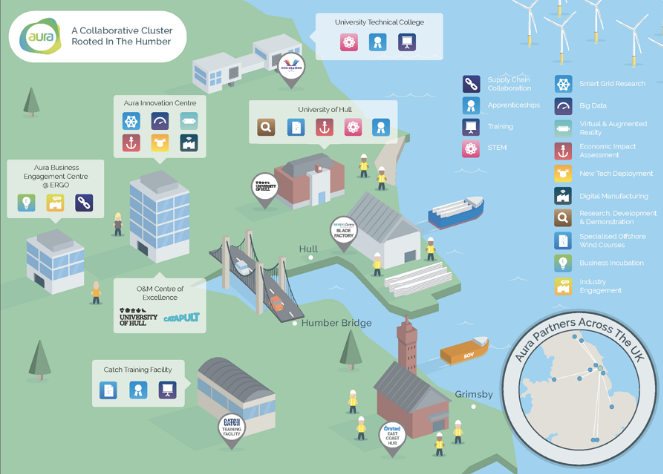
Humber Collaborative Cluster

Offshore Wind Production
Humber Freeport
Following a winning bid, the Humber Freeport was chosen as one of the Government’s preferred freeport sites in March 2021. The Humber Freeport will take in a 45-kilometre area across both banks of the Humber aimed to stimulate economic growth.
The University is working with partners, including local authorities, industry, business and the LEPs to develop the Humber Freeport Innovation Strategy. This details how an Innovation Hub will be central to “the development of a resilient, inclusive, innovation-driven regional economy taking full advantage of the investments in the Freeport and building on previous regional investments including over £60m in offshore wind and low-carbon technology R&D in the Region...”
Flood Hazard and Risk
FIC, established in early 2019, drives forward innovative and commercial thinking in the flood resilience sector. FIC brings together Hull academics, undertaking world-class research with partners within the Humber region. It supports SMEs to develop new products and services to help with flood resilience and brings the University’s research expertise in climate change, flood engineering, logistics, materials and computer science to Humber base SMEs. Specific projects include:
SuDSlab UK – A Living Lab for Sustainable Drainage;
Shaping flood risk management and resilience strategies, nationally and globally; and
Hydralab+ - using experimental models to improve predictions.
University expertise shared at COP26
Academics from the University’s Energy and Environment Institute shared their research and expertise, made global connections, and contributed to key climate discussions at COP26. The implications of the decisions at COP for our global and regional communities are clearly aligned with the University’s work.
‘The Humber region is both the highest-emitting industrial cluster in the UK and one of the most susceptible regions to the impact of climate change impacts, especially flooding. We are committed to working towards Net Zero by 2040 (and on the University campus by 2027). We are supporting and driving regional collaborations on decarbonisation, renewable energy, and adaptation.’ Dr Agota Mockute, NERC KE Fellow, University of Hull
Health
The University’s Faculty of Health Sciences (FHS) ‘is a major contributor to the region's healthcare workforce and carries out world-leading research to tackle some of the biggest health challenges facing society.’
FHS focuses on Improving Health Outcomes: transforming the health of people in our region and beyond has demonstrable success. Examples of research which has real life impact includes:
The Better End of Life Report 2022 – research undertaken by the University of Hull, Kings College London and the University of Cambridge and funded by Marie Curie;
A Study into Covid-19 and memory function; and
Innovative research to tackle alcohol-related hospital admissions
The £1.5m Social Care Innovation Programme aims to:
Address the challenges faced in social care using technologies to support care recipients, professionals, families and friends;
Enhance quality and increase sustainability in the social care sector; and
Explore how care providers can implement and use innovative technology to enhance the quality and sustainability of their services.
The Hull Health Trials Unit (HHTU), established in partnership with Hull University Teaching Hospitals NHS Trust (HUTH), is leading and collaborating on a wide range of studies. The University has invested £1.8m into the newly built Molecular Imaging Research Centre, which along with two other research sites, developed in partnership with the Daisy Appeal charity and HUTH, have been created to provide comprehensive bench to bedside research and clinical facilities, bringing together University and NHS researchers.
Culture
The legacy of being the principal and research partner for Hull UK City of Culture 2017 continues as the University provides support, expertise and commitment to a variety of cultural spaces and activities across Hull and the wider Humber region. Examples include:
Funding partner for Hull’s Freedom Festival: the region’s largest international arts festival. Our contributions include the Wilberforce Institute’s co-curation of ‘Freedom Talks’ and the ‘Sirens Transformations audio-visual experience;
Sponsoring Humber Street Sesh: a festival ‘for the people, by the people’. ‘Providing a platform for emerging musicians, artists and creatives across the region and beyond.’; and
Floodlights: Hull and the lives of its inhabitants has been shaped by its proximity and relationship to water. Working in partnership with Living With Water, Yorkshire Water and the University of Hull, these issues were explored through projection and light installations.
Aspect 3: Results
Maximising the benefit of European Structural and Investment Funds
Having helped develop the regional ESIF strategy the University has since contributed substantially to its delivery, securing around £34 million across a range of programmes and projects. It has started several ERDF programmes which include: SparkFund; FIC; and the Aura Innovation Centre (AIC). All have collectively created an innovation support ecosystem supporting regional SMEs in key sectors.
Details of support programmes for regional SMEs in key sectors.

Support infrastructure
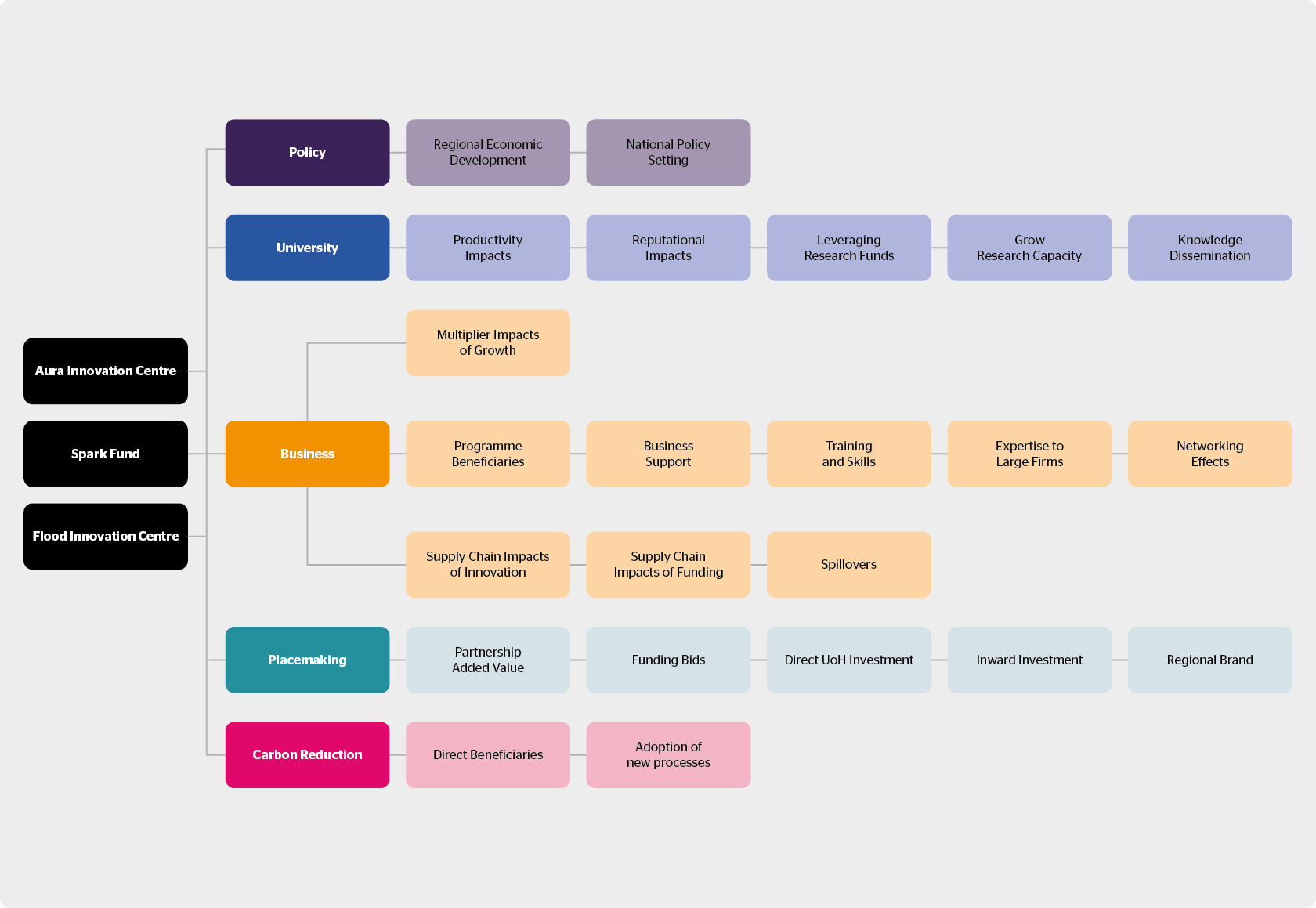
Innovation Support Ecosystem
The University’s £20 million SparkFund is an innovation and grants programme utilising ERDF funding to support SMEs in the Humber, York and North Yorkshire move their business forward through Innovation and R&D including low carbon. £3.5 million via FIC has supported 83 SMEs to develop new flood resilience products and services.
The AIC helps Humber based SMEs reduce their carbon emissions through research and innovation.
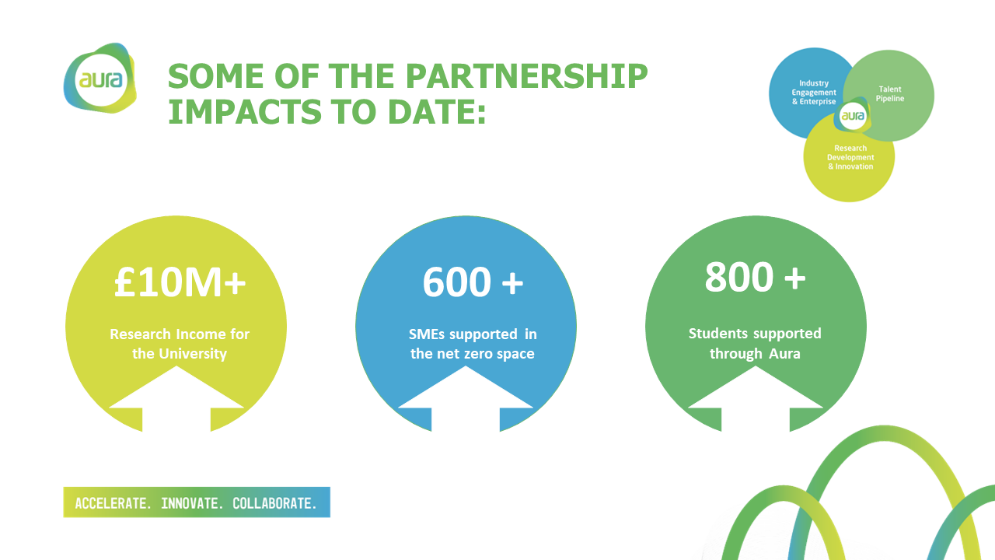
Aura Innovation Centre Impact
Overall, the University has:

Support provided by UoH
Additionally, the University has had a decade of success delivering Knowledge Transfer Partnerships (KTPs) with business partners across the region, supporting the delivery of competitive advantage, increased turnover and entry into new markets. Over 2/3rds of our graduate associates have been offered permanent positions with the company at the end of their KTP.
Low carbon and clean growth
The work of Aura with the Humber Offshore Wind Cluster is home to six operational offshore windfarms supplying 2.5GW of clean energy to British homes and businesses and includes a pipeline of projects which will look to deliver a third (10GW) of the UK’s total energy production by 2030.
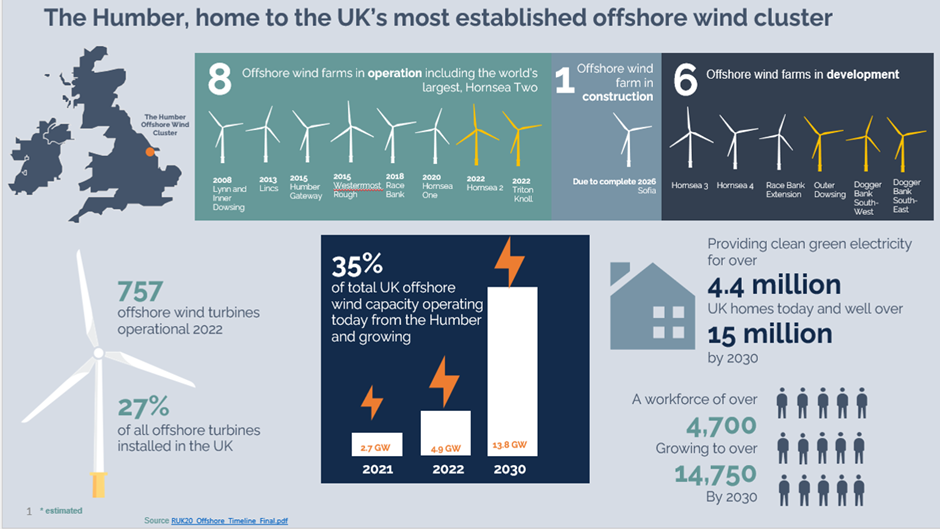
Humber Offshore Wind Cluster
Flood hazard and risk
The University’s Energy and Environment Institute is ‘leading efforts to tackle global environmental resilience and energy sustainability’. Results have been demonstrated through research including Shaping flood risk management and resilience strategies, nationally and globally which has delivered impact on and through UK national flood management policy, and has extended the global reach of this impact through Living with Water Partnership and the development of the City Water Resilience Approach. The research has shaped UK flood preparedness and resilience through its impact on the influential Pitt Review and subsequent Acts of Parliament adopted into the Environment Agency’s 2011 and 2020 Flood and Coastal Erosion Risk Management Strategies for England.
At a local and community level the work of FIC has included:
HFR solutions: delivering skills, knowledge and expertise to the commercial sector building on the team’s years of experience in fire and rescue service work;
Business Support: preparing businesses for flooding, providing a free flood survey and supporting the development of new products and services in the flood resilience market; and
Community Support providing free flood surveys and flood protection advice;
Health
Research undertaken by the University’s FHS continues to have real world resonance and impact. Examples include:
Research into end-of-life care which has contributed to the Marie Curie report Better End of Life 2022;
Addressing key gaps in knowledge related to inequalities in experience of and outcomes from cancer: Tackling Cancer Inequalities; and
Redesigning primary care workforce, workplace and policy. Our award-winning CATALYST programme supports new-to-practice GPs to develop the skills and confidence they need to thrive in the challenges of modern primary care professional practice.
The Social Care Innovation Project has provided £318k of funding to SME Care providers to support the procurement and implementation of technologies and products enabling new services to be developed, enhance the quality of care, increase productivity and improve the quality of life of those to whom they provide care.
Culture
The University’s 2019 evaluation of Hull City of Culture 2017 has highlighted the on-going impact from the city’s year in the cultural spotlight. ‘The evaluation shows that Hull has benefitted from the UK City of Culture title. The increase in tourism has been largely sustained, the cultural sector is better networked and more ambitious, and there is evidence that many of the positive effects of Hull 2017 are continuing to shape the city.’
A quote from the Artistic Director of The Freedom Festival in 2020 highlights the University’s impact on culture within Hull and the local area:
‘Stolen Lives really assisted the Freedom Festival in delivering its core message of transmitting fundamental human values and encouraging people of all ages to think about the meaning of freedom. The performances were hugely well attended by adults and children alike, and the buzz around the Festival made it clear that they…encouraged conversation about the incredibly important topics of slavery and freedom.’ This work links to the work of the Wilberforce Institute on modern slavery and the Humber Modern Slavery Partnership, of which the University is a key partner.
In summary, the University of Hull is a proud and practiced partner in the growth and regeneration of the region in which it is based. Two independent reports have provided positive evidence of that keenly collaborative approach:
‘Huge economic impact of University of Hull revealed in new study’
‘Universities suggest ways of sparking growth across the UK’
Public & Community Engagement
Summary of approach
The University of Hull’s Strategy 2030 provides the framework for our approach to Public and Community Engagement. The university is recognised for its collaborative engagement and its focus on working in partnership to understand and shape local, national and international priorities.
‘As an effective and dynamic partner of choice, we work in strategic collaboration with others to deliver impact with mutual and wider benefit.’
‘A strong sense of place is at the heart of our identity. The global perspective and expertise of our talented people and our dynamic collaborations with partners enable us to bring communities together—to enrich lives, address the challenges facing our region and share solutions that are transferable across an increasingly connected yet polarised world.’
Aspect 1: Strategy
The University’s Strategy 2030 sets out our purpose and the qualities that characterise our work and our university community. The University commits to ‘shaping a fairer, brighter and carbon neutral future’; and to social justice and environmental sustainability.
Public and Community Engagement is key to the University’s Strategy 2030 and Knowledge Exchange Strategy, which both highlight the importance of people, place and partnerships.
Needs based opportunities are central to our strategies and activities in both Local Growth and Regeneration and Public and Community Engagement and link to our Strategy 2030.

Strategy and Drivers
As the only university in the Humber region, public and community engagement within and across the region and beyond is key to identifying these place-based needs and opportunities, some of which are highlighted below. An approach which is needs-based, which shifts and shares power to become a ‘flipped university model’ is demonstrated by the The Ideas Fund.
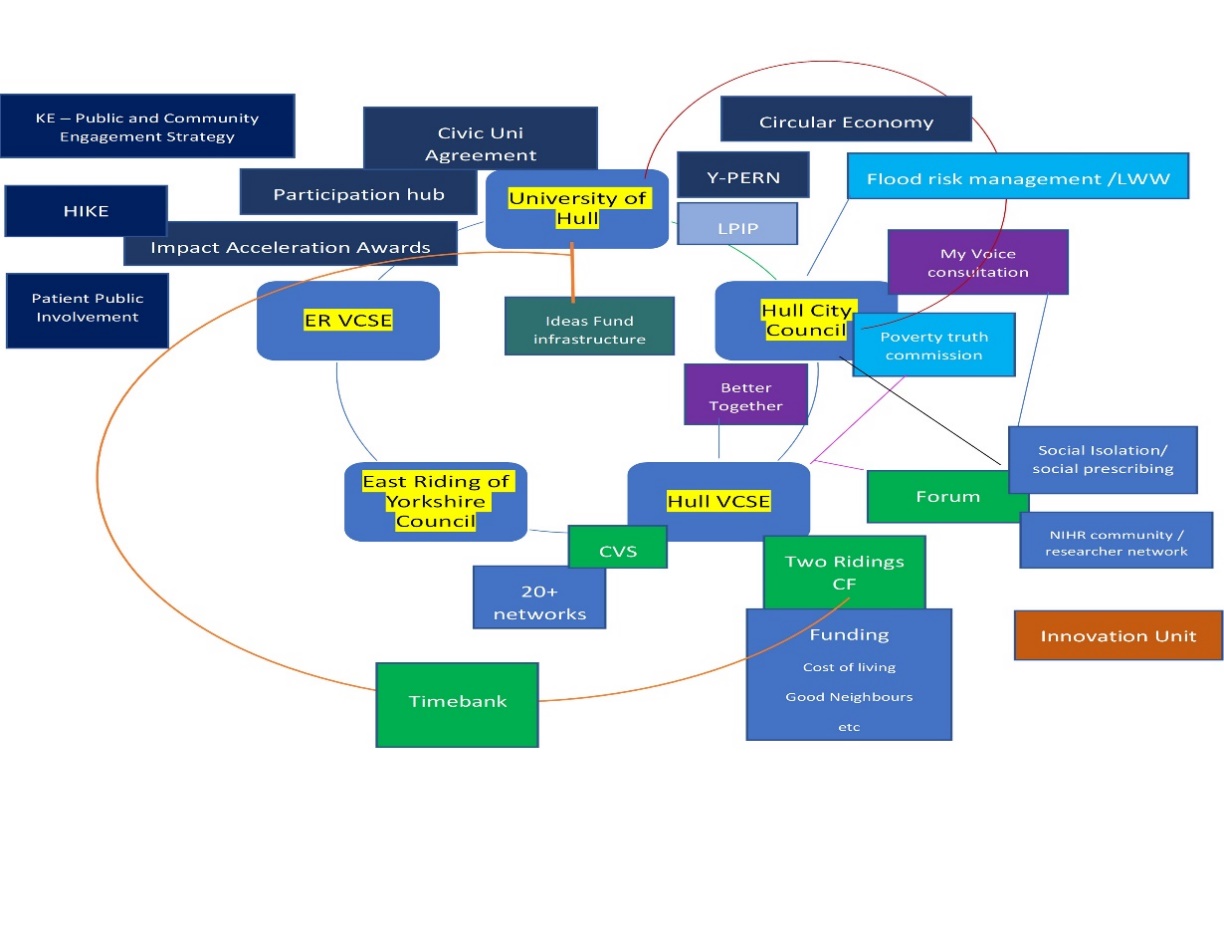
public and community links
Hull’s governance structures embed PCE into the formal agendas of its Knowledge Exchange Committees with each Faculty and School having a designated KE lead whose responsibilities include PCE. The University KE Committee is Chaired by the Pro Vice-Chancellor for Research & Enterprise who has institutional responsibility for KE, including PCE.
University Governance Structure
Aspect 2: Support
Public and Community Engagement (PCE), along with other types of Knowledge Exchange, is rewarded, championed and celebrated by the University; it is an integral part of the Academic Careers Framework and a focus of our annual KE Conference. As well as formal promotion processes, there are also annual KE Awards which recognise PCE activity, as does the annual KE poster competition. PCE stories are shared and celebrated on a monthly basis in the University’s KE newsletter.
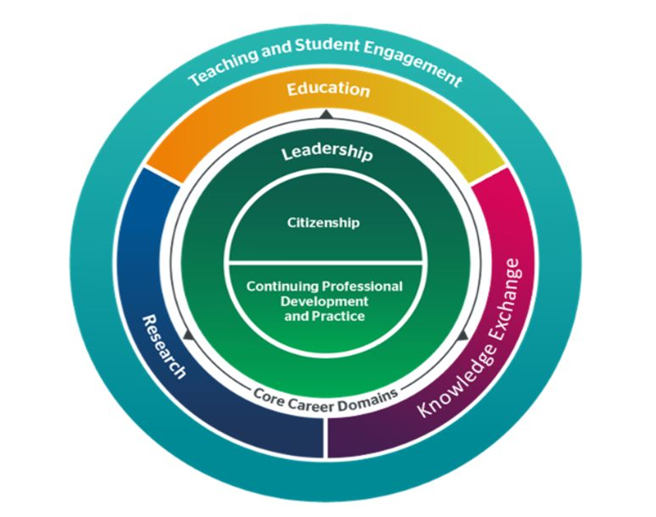
Academic Careers Framework (ACF)
The findings from a recent NCCPE Engage survey provide evidence for the development of wider sharing of best practice, which is being addressed through the development of a champions’ network and communities of practice.
A three-tier approach to supporting staff and students develop PCE skills has been created.
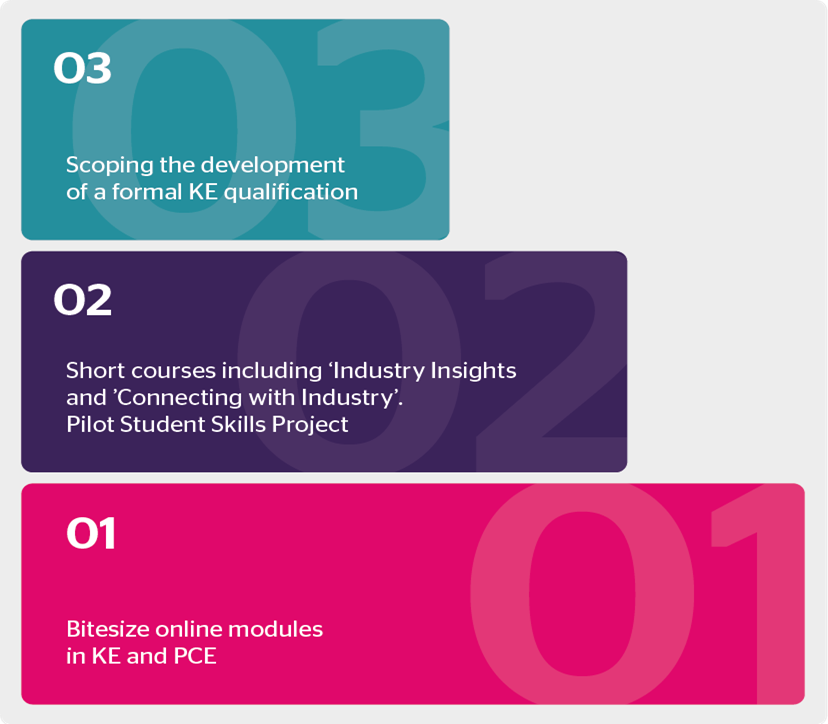
PCE support and Training
These tiers provide a development pathway for all staff and students and support progression for staff on the KE Academic Pathway. Currently, there are 25 academics on the KE pathway, including three professors, one of whom is the lead for science communication and an expert in public engagement.
Provision of short courses has given participants the knowledge and skills to engage and work effectively with a variety of partners. Training and workshops in Participatory Research are provided to staff and their external partners; and a KE skills pilot project for students in 2022 attracted over 50 participants with positve feedback leading to further, upcoming developments.
Aspect 3: Activity
Hull’s PCE is framed within the three pillars of people, place and partnership, along with our commitment to Social Justice and Environmental Sustainability which underpin the delivery of Strategy 2030.
The Ideas Fund exemplifies PCE at the University of Hull. One of only 4 regions to be awarded this funding, 19 projects have been granted since 2021 through this innovative funding scheme which awards the funding to community groups working with researchers and is run by the British Science Association and funded by the Wellcome Trust. A total of c£700,000 has been invested in the Hull projects.
The fund and the projects ‘shift and share power between the partnerships away from traditionally academic-led projects. The innovative approach means that both partners share their knowledge and expertise equitably valuing both lived and learnt experience to enhance the projects. This creates more impact because the ideas come from needs identified by the community.’
‘These projects sit really well with the University’s 2030 strategy, which is committed to social justice and fairness for all, by promoting collaboration between the University and our local communities to contribute to making a difference in Hull.’
Dr Gill Hughes, Ideas Fund Development Coordinator, University of Hull.
Rewilding Youth is an Ideas Fund project which engaged young people in local wooded/green spaces to facilitate immersive ‘wild’ experiences, activities, workshops, events, residential courses. The project has developed into Rewilding Reading, inspiring young people to engage with wild literature through the ‘wild’ experiences. Partnerships with Hull libraries, Schools Information Service, Hull Youth Development Service and Hull City Council have supported the development of the project. Impact has been demonstrated through reported continuation of reading, the set-up of the Rewilding Youth CIC Youth Action research group and a Kickstart programme to plant 30,000 trees which employed 9 young people. Impact has been evaluated from feedback and the project continues outside of the original funding.
The various activities linking directly to Social Justice within the overarching Decolonising Heritage project (see below) provide a model of PCE which include co-created and delivered inclusive heritage projects and activities, working together with a variety of partners and communities. Engagement included co-production with Hull’s diverse communities to develop local projects, with national and international engagement also taking place. Impact has been demonstrated through the numbers of participants, 40,000 visitors to the British Heritage Museum exhibition, and over one million to the RMS Queen Mary, alongside successful funding bids which have enabled work to be broadened and deepened with expertise being recognised and employed internationally. Impact has been evaluated and feedback to communities is highlighted by over 500 positive feedback notes being disseminated in three languages to the communities involved in the activities.
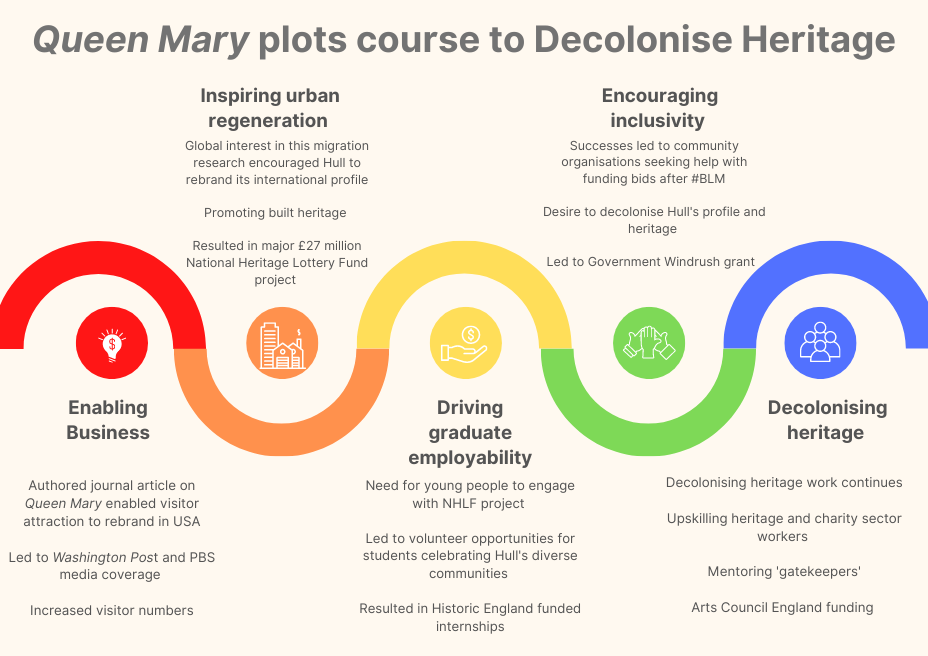
PCE and Social Justice
Tackling Health Inequalities, the HealthiER project is a KE partnership between the University and East Riding of Yorkshire Council. The vision is to deliver an infrastructure that better connects health professionals, patients, and fitness professionals to improve the preventative health agenda in the region. The partnership is unique in the UK as it has evolved to embed an academic team into a Local Authority’s Health and Wellbeing Service. Impact has been demonstrated by the research findings which have been presented at the World Health Organisation’s European network for the promotion of health-enhancing physical activity (HEPA). Impact has been evaluated and HealthiER has been cited by the Local Government Information Unit, The Association of Public Service Excellence, and the Institute of Customer Services, as a model by which local authorities can best deliver the health agenda.
Bringing Breathlessness into View is a continuing project which has developed over the past three years from an original exhibition in 2017. Feedback from that supported the development of workshops for people including patients, carers and clinicians, the development of webpages and membership of the NHSE Breathlessness Group to contribute to the delivery of the NHS Long Term Plan. Impact has been demonstrated by requests to create blogs and material for national websites including the British Heart Foundation, Asthma and Lung UK and the British Journal of General Practice, and membership of the NHSE group. Impact has been evaluated from feedback and a workshop to discuss ideas for future research with patients, carers and clinicians has taken place.
The RESOLVE project to resolve the symptoms of cancer is part of a wider project which aims to directly improve the health status and symptom experience for Yorkshire patients living with advanced cancer. RESOLVE study training resources have been designed to support Palliative Care professionals looking for guidance and support in the use and implementation of Outcome Measures allowing them to assess and monitor changes in the wellbeing of their patients over time. Impact has been demonstrated through the application of these tools which has been part of a monitoring and evaluation process involving the RESOLVE study team, in collaboration with participating site staff and healthcare professionals in the wider community. Impact has been evaluated and the ongoing development of these tools has been inspired by learning experience and feedback gathered.
Supporting local, regional and international efforts to achieve low carbon and clean growth targets, the various strands of research undertaken with partners and communities include the research theme: Societies, Cultures and Climate Justice. This theme aims to ‘enhance the resilience of communities in a changing climate through health sciences, social sciences, humanities, arts and culture.’ Projects within this theme include:
HedgeHunters - This project was developed to support and inform its sister project Hedgerows: Mapping the Gaps, where researchers developed a deep learning model and associated workflow capable of automatically identifying hedgerows and hedgerow gaps from aerial imagery across landscapes.
Citizen Science projects involving the public in research, including CoastSnap, Plastic- Defender or Destroyer? and the SuDSlab project.
Exploring the interpretation of Flood Hazard and Risks by different communities has included work in several areas including:
Flood Stories – Children and young people experience disasters first-hand but often from a very different viewpoint to adults. This project builds on previous research into the experiences of children and young people during and after floods and explores questions about usage of creative and participatory methodologies to explore their experiences and tell their story. Working with partners including the Environment Agency and Lancaster University this project uses immersive storytelling to explore the experiences of flood-affected children and young people;
Risky Cities – is a UKCRP-funded project using Hull’s literary and historical representations of living with uncertain waters and fictions of flooding to learn from the past. Part of the project featured a programme of community engagement projects, based on learnings from earlier work. Working with community groups in and around the city to develop art and creative writing responses to the research findings, local artists were commissioned to transform the creative writing outputs into artworks, which were shared at two events in November 2022. In Autumn 2021 FloodLights, developed in partnership with Absolutely Cultured and Living With Water, was attended by c11,000 people. Impact has been demonstrated through extensive participant reflection and evaluation strategies have captured both the quantitative impact of our activities, and also the longer-term, qualitative impact of the work. The whole process of community engagement has had reciprocity at its core, enabling impact to be evaluated, and progress and findings have been shared with community members and commissioned artists at regular intervals.
Providing open events for the public and communities is key to delivering value for all through PCE.
Open Events over the last three years
Examples include:
The innovative planetarium, a mobile asset which provides free access to schools and other learning institutions;
The HEIF funded Humber Science Festival – established in 2013, the festival was re-launched post-pandemic in 2022 to provide STEM-focused education providers, charities, and industry with a means to engage with public audiences. A series of activities, workshops and shows were part of the day and 15 external contributors took part. Approximately 750 people visited the festival and impact has been demonstrated from the overwhelmingly (98%) positive feedback;
The University’s Legal Advice Centre provides free, confidential and independent legal advice to local community members. The centre has, to date, helped more than 1,000 people.
Anatomy Nights – founded in 2018, Anatomy Nights is an event format that brings the fundamental practice of dissection (non-human) into the public sphere and ensures that anatomists are involved in public engagement presentations about the human body. Events are predominantly aimed at adult audiences, and to facilitate a relaxed learning environment, Anatomy Nights is hosted in casual spaces such as bars and pubs, rather than university campuses. A recent award of $25,000 (USD) by the American Association for Anatomy will further develop the programme.
Sea: the remains between – a Ferens Art Gallery Exhibition, which was a culmination of collective work on microplastics, demonstrating interdisciplinary collaboration across the University and communities in Hull.
Aspect 4: Enhancing practice
Robust evaluation processes are in place. From surveys to focus groups, to longer conversational interviews, relationship building with participants informs our understanding of the difference the PCE activities make. Activity over the past three years over numerous areas of activity has expanded explicitly because outcomes have been evaluated and impact has been demonstrated. Much of this activity has been highlighted within this narrative.
Completed PCE projects, along with other KE activity are highlighted within our monthly KE Newsletter shared institution wide and beyond, within the University e-bulletin and highlighted as best practice through our online learning modules. Externally, many of these projects are used as case studies for specific funding and programmes, such as the Ideas Fund grant and project stories which includes the Hull Roundheads RUFC, Food Cultures for Healing and Wellbeing and The Strong Women of Hessle Road.
As part of the support provided within the online courses that have been developed to support Knowledge Exchange and Public and Community Engagement, the importance of demonstrating and measuring impact and evaluation is highlighted, and course materials have specific sections on these areas. Findings from the recent NCPPE Engage survey have highlighted the need for the institution to provide more support, specifically in relation to coordination of activity and evaluation of that activity.
These findings are being developed into an action plan, which will be considered and prioritised by a newly formed Public and Community Engagement sub-committee which will also lead work to develop a Public and Community Engagement Strategy.
Aspect 5: Building on success
The University has a clear Strategic Vision to ‘shape a fairer, brighter and carbon neutral future’ and Mission ‘to advance…knowledge and understanding through teaching and research, for the benefit of individuals and society at large’.
The University’s strategic goals and ambitions for Public and Community Engagement link directly to and deliver against Strategy 2030, the underpinning framework of people, partnerships and place, along with the continuing commitment to Social Justice and Environmental Sustainability. Clear alignment with our strategy, vision and mission has been demonstrated through our activity.
There is a recognised need to improve the support we offer our staff and students, as demonstrated by the NCPPE Engage survey findings. The convening of a sub-committee specifically focused on Public and Community Engagement evidences the desire to improve our support offering.
There is established governance in place in relation to reporting of activity which includes formal reporting to the University KE Committee, sub-committees and steering groups. The KE Committee reports to the University Leadership Team, Senate and Council.
External reporting is a continual process, providing various reports during the project lifecycle to partners, communities and funders. Evaluation of activity is fundamental to ensuring that our work with partners, public and communities delivers impact and best value.
Community involvement and co-production is evident across institutional activity in PCE. The Ideas Fund provides an exemplar template where decisions around the focus and type of research that takes place is made by communities, not academics – The Flipped University model.
It is recognised that community involvement and co-production is integral to the development of our planned PCE Strategy, with coordination across the institution to ensure engagement on this work and associated workstreams, including the development of a Civic University Agreement takes place, appreciating that PCE aligns with and compliments this and other areas of activity.
Note You are currently viewing the latest version of this narrative statement. View the previous version as published in previous iterations of the KEF (KEF1 and KEF2)
